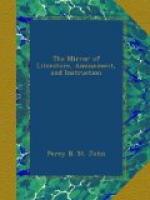to be implicated in the affair. It was ascertained
by the investigation that General Lewicki,
Russian commander of the town, independently of the
lodgings he occupied, received payment for more than
a hundred lodgings; that General Gendre
received payment of 212l. 10s.; that Philippeus,
cashier to the grand duke, received from the same
fund 225l. annually, which was sweetened by a prompt
payment of 2,500l., being ten years in advance; and
that the coachmen and lackeys of the grand duke and
generals received money from the same fund, instead
of wages from their masters. As the inflexibility
and integrity of those gentlemen were proof against
all bribes, the generals foresaw the impending storm
which threatened to break and overwhelm them.
In this critical situation, they conceived one of the
most atrocious plots on record. Its object was
to create a disturbance, by which the town-house should
be set on fire, and the documents which implicated
them in the pillage should be consumed. They agreed
to produce this by arming a number of students; and
their agent was an officer in the army, known to belong
to the secret societies. The sum of 200 ducats
in gold was paid him as a reward for anticipated services,
and 200 stand of arms was provided him. For such
a project this man seemed a fit agent. He took
lodgings in the house where the students met to hold
their deliberations, opened to them his revolutionary
views, and represented himself as one qualified to
rescue their common country from the grasp of despotism.
He so far ingratiated himself into their confidence
as to obtain some knowledge of the general plan for
the freedom of Poland. Circumstances, however,
created distrust of this new and overzealous auxiliary;
and the students refused to act with him, or to receive
the muskets the generals had provided for distribution.
Communication having now ceased between Petrikowski
and the students, he took lodgings in the next room
to that in which they met to hold their deliberations;
what he overheard was communicated to the generals;
and ten students were in consequence denounced, arrested,
and severely flogged (by an arbitrary order of the
grand duke,) to make them divulge their associates.
Though writhing under the whip of the executioner,
not a word escaped their lips to inculpate their friends,
or impart a knowledge of the schemes that had so long
engrossed their thoughts. The severity of the
punishment may be conceived by the fact, that one
of the number died soon after its infliction.
The students were kept in solitary confinement, and
their punishment remained uncertain; universal sympathy
was felt for their sufferings by their comrades, coupled
with an ardent desire to relieve them; but by this
time danger threatened to implicate a great part of
their body, and it was ascertained that an order to
arrest a great number was to take place on the 30th
November. On the 27th November, an order arrived
in Warsaw from the emperor, to send to Riga with all




